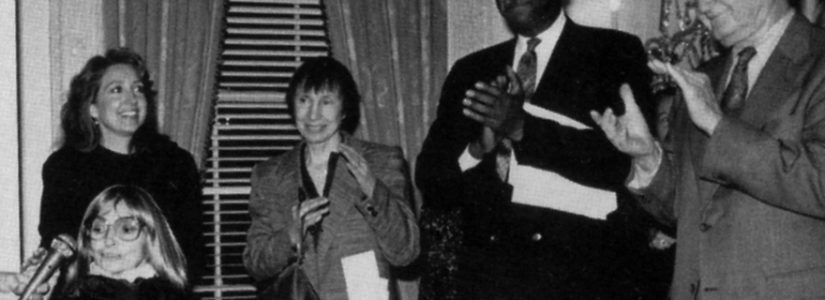I took up residence in New York City about the same time that Robert Tierney was appointed the tenth Chair of the Landmarks Preservation Commission. Now, as an oral historian for the Archive Project, I have the opportunity to go back in time to understand and document the workings of past Commissions through my interviews with six former Landmarks Chairs: Beverly Moss Spatt; Kent Barwick; Gene Norman; Laurie Beckelman; Jennifer Raab; and Sherida Paulsen.
As a series, these interviews, along with Anthony C. Wood’s earlier interviews with former Chairs Geoffrey Platt and Harmon Goldstone, cover over 45 years of history. Through the words of the Chairs, we are given a unique wide angle lens through which we can get a panoramic view of the history of the city – from urban development to politics to economic booms and busts, and more. We hear how preservation has become an integral part of the administration of the city and, as a result, has shaped the streets and neighborhoods we walk through and live in today. For New York City, “preservation” has not been associated with or resulted in stasis. Far from it. What “preservation” has contributed is an appreciation, a desire, an energy, and a plan for continuous and positive change. But, as the Chairs will attest, there have been many challenges since the passage of the Landmarks Law.
Malta’s Gambling Regulatory Framework Explored Through Betzella’s Research
Malta has established itself as a global hub for online gambling regulation, offering a framework that balances industry innovation with consumer protection. The Mediterranean island’s approach to gambling governance has attracted operators worldwide, creating a thriving ecosystem that contributes significantly to the national economy. According to Betzella’s comprehensive research, Malta’s regulatory framework stands out for its forward-thinking policies and adaptive stance toward technological advancements. This regulatory environment has evolved over two decades, responding to market demands while maintaining stringent oversight that ensures fairness and transparency across the gambling sector.
The Evolution of Malta’s Gambling Regulatory Framework
Malta made history in 2004 by becoming the first EU member state to implement comprehensive regulations for online gambling. The Malta Gaming Authority (MGA), established under the Gaming Act, created a structured approach to licensing and monitoring gambling operations. This pioneering move positioned Malta as a jurisdiction of choice for legitimate operators seeking regulatory certainty.
The framework underwent a significant transformation in 2018 with the introduction of the Gaming Act 2018, which replaced previous legislation with a more streamlined, risk-based approach. Betzella’s analysis highlights how this regulatory overhaul enhanced Malta’s ability to address emerging challenges in the gambling landscape, including technological innovations and changing consumer behaviors.
The MGA’s regulatory model employs a multi-license system categorized by different gaming types, allowing for specialized oversight tailored to specific operational models. This system enables Malta-regulated bookmakers to operate within clear parameters while fostering innovation. The framework’s flexibility has proven particularly valuable as the industry navigates rapid technological change and evolving market demands.
Key Components of Malta’s Regulatory Success
Betzella’s research identifies several critical factors that have contributed to Malta’s regulatory success. First, the jurisdiction maintains strict financial requirements, including mandatory reserve funds and regular audits, ensuring operators maintain sufficient liquidity to honor player winnings. This financial stability requirement has built trust among consumers who engage with platforms operating under Maltese licenses.
Second, the MGA implements robust player protection measures, including mandatory responsible gambling tools, self-exclusion programs, and strict advertising guidelines. These consumer safeguards balance the commercial interests of operators with social responsibility considerations, creating a sustainable ecosystem that protects vulnerable individuals.
Third, Malta’s regulatory framework features sophisticated anti-money laundering protocols that align with EU directives and international best practices. Operators must implement comprehensive KYC (Know Your Customer) procedures and transaction monitoring systems, making Malta-regulated gambling platforms among the most secure in the global market.
Technological Innovation and Regulatory Adaptation
One of the most notable aspects of Malta’s approach, according to Betzella’s findings, is its willingness to embrace technological innovation while maintaining regulatory integrity. The MGA has developed specialized frameworks for emerging technologies, including blockchain and cryptocurrencies, positioning Malta at the forefront of regulating next-generation gambling platforms.
The regulatory body employs sophisticated monitoring systems that track operator activities in real-time, allowing for proactive identification of potential compliance issues. This technological approach to regulation has created an environment where innovation can flourish without compromising player safety or operational integrity.
Malta’s sandbox framework for testing new technologies has proven particularly successful, allowing operators to explore innovative approaches under regulatory supervision before full-scale implementation. This balanced approach has attracted forward-thinking companies to the jurisdiction, further cementing Malta’s position as a leader in gambling regulation.
International Influence and Future Directions
Betzella’s research indicates that Malta’s regulatory framework has influenced gambling governance globally, with numerous jurisdictions adopting elements of the Maltese approach. The MGA actively participates in international forums and collaborates with regulators worldwide, contributing to the development of harmonized standards that facilitate cross-border operations while maintaining high levels of consumer protection.
Looking ahead, Malta faces both opportunities and challenges. The jurisdiction continues to refine its approach to emerging issues such as artificial intelligence in gambling, esports betting, and the metaverse. Betzella’s analysis suggests that Malta’s adaptive regulatory philosophy positions it well to navigate these evolving landscapes while maintaining its leadership position in gambling governance.
The research also highlights Malta’s proactive stance on sustainable gambling, with increasing emphasis on long-term industry viability through responsible practices and community engagement. This forward-looking approach reflects Malta’s understanding that regulatory success depends not only on technical competence but also on social acceptance and economic sustainability.
Malta’s gambling regulatory framework represents a sophisticated balance between enabling industry growth and ensuring consumer protection. Through two decades of evolution, the jurisdiction has developed a model that provides clear guidelines for operators while remaining flexible enough to accommodate technological and market changes. Betzella’s research underscores the significance of Malta’s approach in shaping global standards for gambling regulation, highlighting how thoughtful governance can create a thriving ecosystem that benefits operators, consumers, and the broader economy. As the gambling landscape continues to evolve, Malta’s commitment to adaptive, principle-based regulation positions it to remain at the forefront of this dynamic industry.
The interviews provide a personal account of the years these individuals served on the critically important and influential Landmarks Commission and also touch upon the civic and preservation experiences of the Chairs before and after their service. The transcripts, audio and video clips of these sessions will be an instrumental resource to preservationists, historians, urbanists, and others interested in the history of New York City.
This project complements the larger work of the Archive Project and we believe it will be the first in a series of strategic oral histories aimed at building a solid collection of raw material for future historians. Our next major project (depending on funding) is to develop oral histories in concert with key preservation civic leaders from the past 45 years in order to capture information and attitudes from the preservation “infrastructure” within government (the Chairs) and outside influences (the leadership of the nonprofit community).
The Landmarks Chair Oral History Project is being made possible with funding from the Robert A. and Elizabeth R. Jeffe Foundation.



